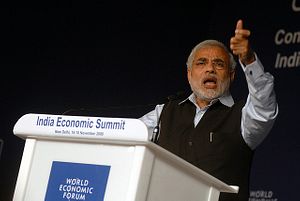Indian elections this time around are turning out to be not only hotly contested but also bitterly fought. Bitterness has assumed such proportions that politicians’ private lives are becoming major issues. In its attempt to scandalize private lives, the Indian media has also brought itself in for scrutiny, exposing its own shortcomings. The infighting between parties also lays bare the underbelly of Indian society — its hypocrisy, its attitude towards women, and its parochialism.
When Narendra Modi, the opposition BJP’s prime ministerial candidate, declared his marital status while filing his nomination papers from his parliamentary constituency a few weeks ago, the issue immediately became a major point of contention. Questions were raised regarding Modi’s decision to keep his marriage a secret so far in his political career. His political opponent raised this issue in election rallies and questioned the BJP leader’s claims of giving dignity and security to women when he cannot take care of his own wife. It is true that the Gujarat Chief Minister’s personal life has always remained under wraps. No one to this day knows with certainty why he left his first wife.
Feeling cornered, the BJP then raised the issue of Congress leader Rahul Gandhi’s purported relationship with his Colombian girlfriend. In order to score political points, Ramdev, a Yoga guru with dubious credentials and a strong proponent of the BJP, accused the young Congress leader of having a “nice time” with lower caste women when he visits their homes to mobilize political support.
But what has kept Indian social media charged and the trolls going is the revelation of Congress leader Digvijay Singh’s relationship with a young female journalist. A couple of days ago, some photographs of the veteran leader appeared on social media and immediately went viral. On Wednesday, Singh, the former Chief Minister of Madhya Pradesh, declared his relationship with the broadcast journalist and announced his intention to marry her.
Singh has been a widower for a year and the journalist is awaiting the legalization of her divorce with her husband. She alleged that her computer had been hacked and her private pictures were made public. There is nothing immoral about two individuals having a relationship yet the Indian media has made it so.
We need to ask what was the intention behind leaking intimate pictures of this politician when the elections are at a crucial stage. Who hacked the journalist’s computer? The Congress leader is known for his sharp wit. He is very active on social media and takes on the BJP on every issue. The revelation and the pictures become a tool in the hands of right-wing politicians and their supporters to attack and mock him. In his defense, Singh says that, unlike Modi, he has made his marital status public.
The whole debate has taken India’s political discourse to a new low. Media (both print and television) are indulging into voyeurism by publishing these pictures and showing them constantly without respecting the privacy of the individuals concerned.
We as a society expose our own parochialism by giving such importance to normal human tendencies. By questioning the woman we are disregarding her right to have a life of her own choice; we are questioning her judgement and decision to lead her life on her own terms.
Raking up the personal lives of individual politicians is an attempt to divert attention from the real issues. As the elections go on to the final rounds, the focus of the debate is shifting. Most of the seats going to the polls in the next rounds are in Uttar Pradesh and Bihar — two crucial states which account for 120 seats out of the 545 in the Lok Sabha. By digging into the personal lives of politicians and by using derogatory comments to incite tensions between religious groups, India’s politicians are resorting to cheap tactics to gain power.

































